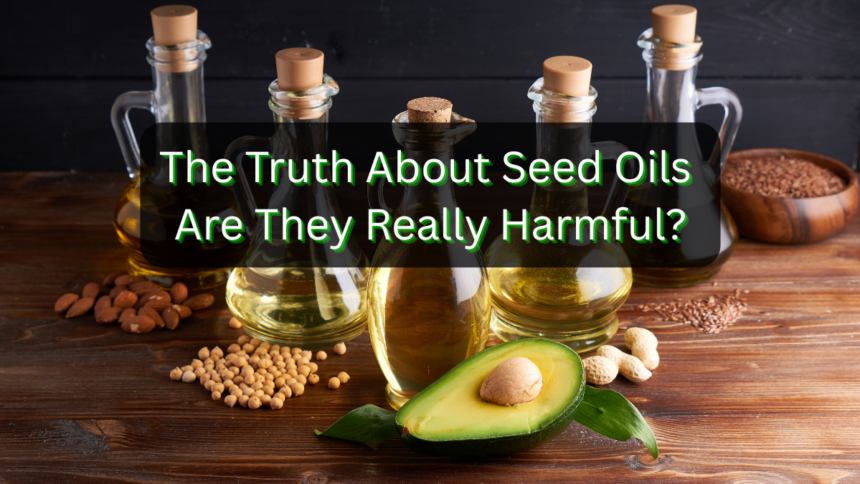Truth About Seed Oils
If you’ve spent any time on health and wellness blogs or social media lately, you’ve probably heard the heated debate about seed oils. Some claim they’re toxic and inflammatory, while others argue they’re a harmless (and even healthy) part of a balanced diet. So, what’s the real story?
In this post, we’ll break down the science, myths, and facts about seed oils to help you make an informed decision. Let’s dive in.
What Are Seed Oils?
Seed oils are vegetable oils extracted from the seeds of plants, such as:
- Soybean oil
- Canola oil (rapeseed oil)
- Sunflower oil
- Corn oil
- Cottonseed oil
- Safflower oil
These oils are highly processed and commonly used in cooking, packaged foods, and restaurant frying due to their low cost and high smoke points. But are they bad for you?
Video Credits
The Controversy: Why Are Seed Oils Considered Unhealthy?
Critics argue that seed oils pose several health risks, including:
1. High in Omega-6 Fatty Acids
Seed oils are rich in omega-6 fatty acids, which, in excess, may promote inflammation when not balanced with omega-3s (found in fish, flaxseeds, and walnuts). Chronic inflammation is linked to heart disease, diabetes, and autoimmune conditions.
2. Highly Processed
Most seed oils undergo heavy refining, bleaching, and deodorizing, which may strip away nutrients and introduce harmful compounds. Some experts worry that industrial processing creates oxidized fats, which could contribute to cell damage.
3. Linked to Chronic Diseases
Some studies suggest a correlation between high seed oil consumption and obesity, heart disease, and metabolic disorders. However, correlation doesn’t equal causation, and more research is needed.
4. Used in Ultra-Processed Foods
Seed oils are a staple in fast food, chips, and baked goods—foods already linked to poor health outcomes. It’s hard to separate the effects of the oil from the overall poor quality of these foods.
Are Seed Oils Really That Bad? The Other Side of the Argument
Not everyone agrees that seed oils are harmful. Here’s why some experts defend them:
1. They’re Not the Only Source of Omega-6s
While omega-6 fats can be inflammatory in excess, they’re also essential for brain function and cell growth. The key is balance—not elimination.
2. Some Seed Oils Contain Beneficial Nutrients
For example, sunflower oil has vitamin E, and canola oil contains heart-healthy monounsaturated fats.
3. The Science Isn’t Settled
While some studies raise concerns, others show that replacing saturated fats (like butter) with unsaturated fats (like seed oils) may improve heart health.
4. Moderation Matters
The dose makes the poison. Using small amounts of seed oils occasionally is unlikely to cause harm, especially if your diet is otherwise rich in whole foods.
Tips for Making Healthier Oil Choices
If you’re concerned about seed oils but don’t want to eliminate them entirely, here are some practical tips:
1. Opt for Cold-Pressed, Unrefined Oils
Oils like extra-virgin olive oil, avocado oil, and coconut oil are less processed and retain more nutrients.
2. Balance Omega-3 and Omega-6 Fats
Eat more fatty fish, chia seeds, and walnuts to maintain a healthier fatty acid ratio.
3. Avoid Ultra-Processed Foods
Since seed oils are common in junk food, cutting back on packaged snacks can reduce your intake naturally.
4. Cook with Stable Fats at High Heat
For frying, use oils with high smoke points like avocado oil or ghee instead of highly refined seed oils.
5. Read Labels
Check ingredient lists for soybean, corn, or cottonseed oil, especially in salad dressings and margarine.
Final Verdict: Should You Avoid Seed Oils?
The truth lies somewhere in the middle. Seed oils aren’t inherently toxic, but their overconsumption—especially in processed foods—may contribute to health issues. If you eat a whole-food-based diet and use seed oils sparingly, they’re unlikely to be a major concern.
However, if you’re dealing with chronic inflammation or metabolic issues, reducing seed oils and choosing healthier fats might be beneficial.
What’s Your Take?
What’s your experience with seed oils? Have you noticed any health changes after cutting them out? Share your thoughts in the comments below!
And if you found this post helpful, don’t forget to share it with friends and family who might be wondering about seed oils too.


